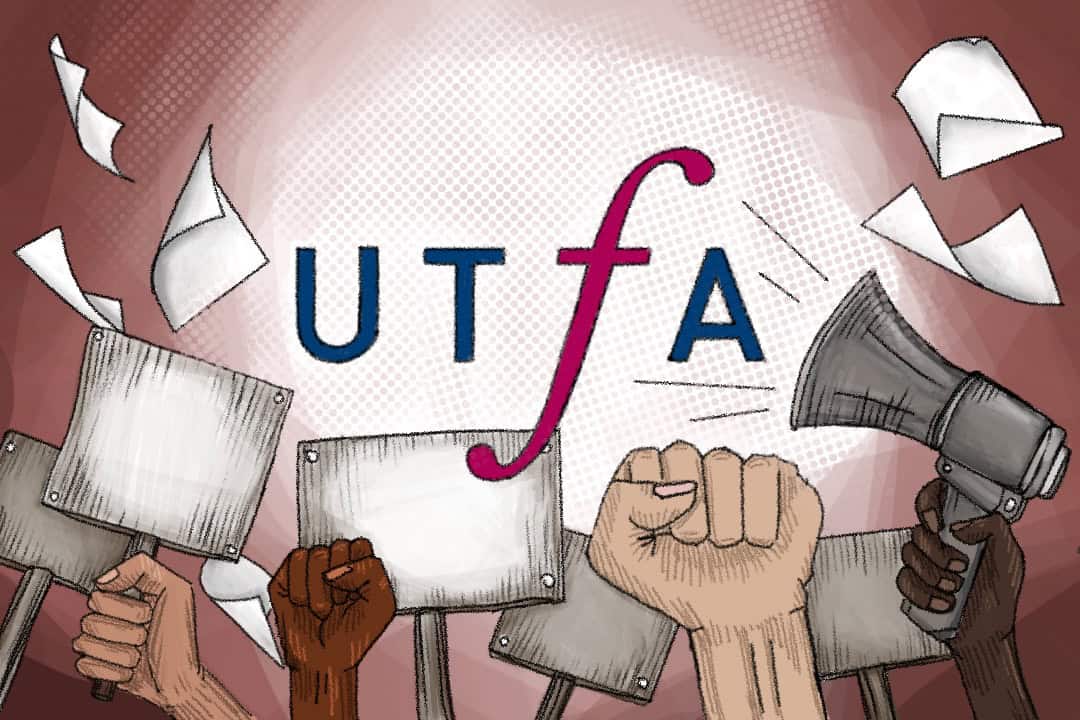On October 22, the University of Toronto Faculty Association (UTFA) issued a letter to U of T’s Provost and Vice-President Trevor Young criticizing the User Guide to U of T Policies on Protest and Use of Campus Spaces created in August.
In the letter, the UTFA executive committee had “strong concerns about the Administration’s violations of the Memorandum of Agreement.” The UTFA claims that the protest policy “violates the freedom of association and collective bargaining rights of UTFA and other campus labour unions.”
What is U of T’s protest user guide?
The protest user guide is a guideline for students and other U of T community members regarding protesting on campus. The guide was released almost two months after the 63-day pro-Palestine encampment at King’s College Circle concluded.
In late October, U of T updated the guide to include a preamble and case studies that show “examples of student activities which may violate policy.”
Based on pre-existing policies, the user guide states that while the university is “guided by a commitment to the right of its community members to express and discuss ideas freely,” “there are limits” to that expression.
The guide states that university policies prohibit anyone from occupying or entering U of T property without permission; setting up tents, encampments, fences, barriers, or other structures on campus; making noise that hinders the speech of guests or that interferes with activities at U of T; putting up signs, posters, or flyers — including those that use chalk, markers, paint, and projections — outside of designated areas; or taking any other action that would be a security threat to U of T campus and community.
The guide states that anyone who participates in “these prohibited activities” may face “consequences under law and U of T policies, including arrest, suspension, trespass from property, and expulsion.”
The guide cites the Ontario Superior Court order from July 2 — which granted U of T permission to remove the encampment and stated that any police authority could “arrest and remove any person who has knowledge of this Order” for “interfering with… access to University property.”
UTFA’s response letter
UTFA’s letter argues that the new protest user guide “unfairly limits the rights of campus unions to engage in constitutionally protected job actions.” UTFA’s executive committee called on the university “to fully rescind” the guide and “to announce that it has done so as soon as possible and no later than November 1, 2024.” As of writing, U of T has not revoked the guide.
In an email to The Varsity, UTFA’s President and an Associate Professor in OISE’s Department of Social Justice, Terezia Zorić, wrote, “In publishing the User Guide the [a]dministration has gone well beyond its legal authority to exercise restraint.” She added that the guide “puts express prohibitions on the how, when, where, and manner of protest, backed up by potential legal sanctions extending to arrest and trespass.”
“This could, for example, limit our members’ freedom of association as a labour organization or discourage individual faculty members and librarians from engaging in legitimate forms of scholarly and political debate that are protected by our Memorandum of Agreement,” wrote Zorić. A Memorandum of Agreement is a document written between two parties to work together on an agreed-upon project or meet an agreed-upon objective.
Finally, the UTFA letter mentions the recent “concerning” remarks by U of T President Meric Gertler during the September Conference on Historical and Contemporary Antisemitism, where Gertler highlighted the user guide as one of the university’s efforts to address antisemitism.
The letter states, “It is deeply worrying to hear a senior [a]dministrator emphasize the need for punitive measures… for ‘hurtful or offensive’ speech — actions that fall well short of legal definitions of hate speech or discrimination.”
The president had noted in his remarks that, “where the action or speech in question is hurtful or offensive but not unequivocally antisemitic, corrective intervention may still be called for, to help community members appreciate how their behaviour has negatively impacted others around them.”
In their letter, the UTFA argued that Gertler’s “expansive and vague interpretation of what could trigger disciplinary action risks fostering a climate of fear and censorship.”
The university’s response
When asked about the UTFA’s concerns, a U of T spokesperson wrote in an email to The Varsity to refer to the preamble of the guide, which states, “The [u]niversity has received a number of questions regarding this User Guide including in relation to its scope and application.”
“This [g]uide was prepared as an [educational] resource primarily for students, though it may be helpful for members of our community to be reminded of existing policy,” stated the preamble. “It may be updated in the future to reflect changes to law and/or policy. The guide does not establish a new policy. Any corrective action will be taken in accordance with the underlying policies and/or law.”



No comments to display.